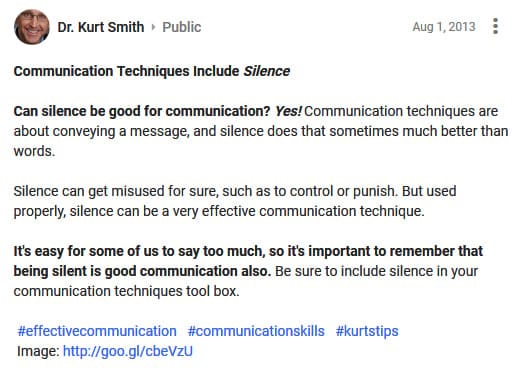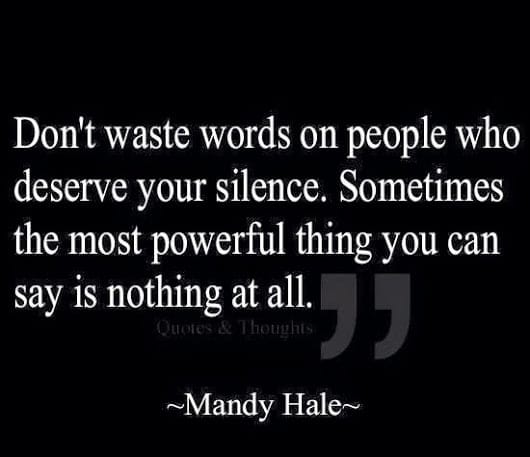What can you do if you're Fighting With Your Husband Constantly?

4 Min Read
Contents
Most people would argue that silence isn't communication. In fact, they'd probably say that it's just the opposite of communicating. But the truth is, depending on how it's used, silence can be a really good communication skill.
A common communication pattern in problem relationships is one partner talking too much and the other partner talking too little. So, is there really a place for silence in healthy relationships? Yes.
It would be easy to assume that it's men who are too quiet and women who talk more than necessary, but that's not always the case. Sometimes these stereotypes are reversed.
We all can agree that too much of an imbalance between partners as to who does the talking is going to be a problem. Yet there is a place for silence among good communication skills. To begin to understand how, take a look at this social media post I wrote.


A well-known statistic is that 93% of communication is non-verbal. There's some dispute among experts as to the accuracy of that exact number. However, there is no dispute among researchers and communication experts that the majority of communication takes place in other forms than the words we speak.
Considering this fact, it begins to make some sense as to how silence could be a good communication skill, particularly since it's true that so much of our communication is non-verbal.
Here are a few other reasons why silence is good for communication:
The researcher who came up with the 93% of communication is non-verbal statistic is Dr. Albert Mehrabian. His studies found that 7% of a message is conveyed through words, 38% through vocal elements (tone, volume, etc.), and 55% through nonverbal elements (facial expressions, gestures, posture, etc.).
This is really important to be conscious of in this era of increasing digital communication. Texts and emails don’t allow for the non-verbal communication to come through. Nor does silence work well with these tools, because it’s more often seen as hostility or even ghosting. So, when it comes to communication within your relationship, face-to-face is always best.
Silence isn’t the only communication skill that's underused in relationships. Sadly, over time, may couples lose the ability to communicate with each other effectively at all. So, as you are working toward improving your communication, consider using these tools as well.
We all can become more effective communicators when we practice these skills, especially adjusting our tone to the situation and managing gestures so they don't pile on top of our words (more on effective communication skills).
Think about how you might be able to use silence and the skills listed above more often in your relationship. Improving your communication skills may just be what saves your marriage, or at least what keeps it pleasant.
Editor's Note: This post was originally published April 19, 2014 and has been updated with new information for accuracy and comprehensiveness.
What can you do if you're Fighting With Your Husband Constantly?
It’s safe to say we’ve all been lied to at some point. Perhaps we’ve even done the lying ourselves once or twice, too. And we can probably agree that lies, even small ones, can be harmful – especially in a relationship.
Does the Communication In Your Marriage Need To Improve? Learn 5 key strategies to Improving Communication in any Marriage (or relationship).
© 2026 Guy Stuff Counseling & Coaching, APC, All Rights Reserved.
Privacy Policy | Sitemap | Do Not Sell or Share My Information
Featured logos are trademarks of their respective owners.
I choose to be silent because wife tells me I repeat myself to much and I can't hold an interllectual conversation. We have a problem cutting each other off while talking. I m tired of trying when all I ask is to be talked to with respect and forgive me for my past wrongs. I don't feel like i get either.
Great post.
NIce post!your post can prove that silence is a really good communication skill.Thanks for sharing.
Thanks, Mack & Nicola.